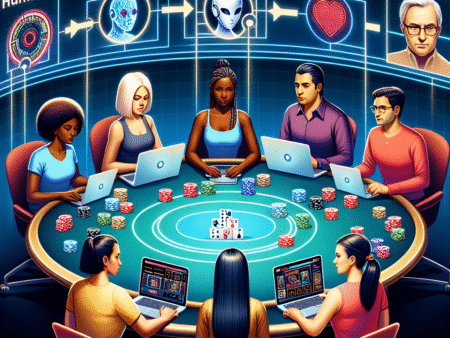How Blockchain is Reshaping Online Casino Transparency
The online casino industry is continuously evolving, driven by technological advancements and the demand for more secure and transparent gaming experiences. One of the most transformative technologies impacting this sector is blockchain. By providing an immutable and decentralized ledger, blockchain technology is reshaping how online casinos operate, ensuring greater transparency and trust among players. In this article, we explore how blockchain is revolutionizing the online casino industry and what it means for the future of gaming.
Table of Contents
- Understanding Blockchain Technology
- Why Transparency Matters in Online Casinos
- Blockchain: Enhancing Casino Transparency
- Benefits of Blockchain for Players
- Challenges and Considerations
- The Future of Blockchain in Online Casinos
- Related Articles
- FAQ
Understanding Blockchain Technology
Blockchain is a decentralized and distributed digital ledger that records transactions across multiple computers in such a way that the registered transactions cannot be altered retroactively. Each block in the chain contains a number of transactions, and every time a new transaction occurs on the blockchain, a record of that transaction is added to every participant’s ledger. This technology is the backbone of cryptocurrencies like Bitcoin and Ethereum, offering transparency, security, and efficiency.
For more detailed information about blockchain, you can refer to Wikipedia’s Blockchain page.
Why Transparency Matters in Online Casinos
Transparency in online casinos is crucial for building trust between the casino operators and players. With the digital nature of online gaming, players often have concerns about the fairness of games, the security of their personal and financial information, and the legitimacy of the casino operations. Transparent practices ensure that players can verify the fairness of games, understand the odds, and trust that their data is secure.
Moreover, transparency can lead to increased player loyalty and a better reputation for the casino, which is vital in a competitive industry. For insights into fair gaming practices, the Casino.org blog provides valuable perspectives.
Blockchain: Enhancing Casino Transparency
Blockchain technology enhances transparency in online casinos in several key ways:

- Immutable Records: Blockchain’s decentralized nature ensures that once a transaction is recorded, it cannot be tampered with. This immutability is crucial for ensuring the integrity of game outcomes and financial transactions.
- Provably Fair Gaming: Blockchain allows for provably fair gaming, where players can verify the fairness of each game round themselves. This is achieved through cryptographic algorithms that provide evidence of fairness.
- Decentralized Control: With blockchain, control is decentralized, reducing the risk of manipulation by a single entity. This decentralization builds trust among players who may be wary of centralized casino operations.
For more on how blockchain is applied in the gaming industry, check out iGamingBusiness.
Benefits of Blockchain for Players
Players stand to gain significantly from the adoption of blockchain technology in online casinos:
- Security: Blockchain’s encryption and decentralized network provide enhanced security for player data and financial transactions.
- Fairness: With provably fair gaming, players can independently verify the fairness of games, leading to a more trustworthy gaming environment.
- Faster Transactions: Blockchain enables faster deposit and withdrawal processes compared to traditional banking methods, enhancing the overall gaming experience.
- Lower Fees: The reduction of intermediaries in blockchain transactions can lead to lower fees, benefiting both players and casino operators.
To explore more about player benefits and casino promotions, visit our casino offers page.
Challenges and Considerations
Despite its potential, the integration of blockchain into online casinos is not without challenges:
- Regulatory Concerns: The regulatory environment for blockchain and cryptocurrencies is continually evolving, presenting challenges for casinos operating in various jurisdictions.
- Technical Complexity: Implementing blockchain technology requires significant technical expertise and resources, which can be a barrier for some operators.
- User Adoption: While blockchain offers numerous benefits, widespread user adoption is still in the early stages, and some players may be hesitant to embrace the technology.
For an in-depth look at the regulatory aspects of blockchain in gaming, GamblingNews provides extensive coverage.
The Future of Blockchain in Online Casinos
The future of blockchain in online casinos looks promising, with potential for widespread adoption as technology continues to develop. As more players and operators recognize the benefits of blockchain, it is likely to become a standard in the industry, promoting transparency, security, and trust. Innovations such as smart contracts could further automate and streamline casino operations, providing even more efficient and transparent gaming experiences.
For insights into other games that may benefit from blockchain, check out our Baccarat page and explore how blockchain could enhance traditional card games.
Related Articles
- Blockchain and Sports Betting: A New Era of Transparency
- How Blockchain is Transforming Online Jackpots
- The Impact of Blockchain on Casino Bonuses
FAQ
What is blockchain technology?
Blockchain is a decentralized digital ledger that records transactions across multiple computers, ensuring that each transaction cannot be altered retroactively.
How does blockchain enhance transparency in online casinos?
Blockchain enhances transparency by providing immutable records, enabling provably fair gaming, and decentralizing control to prevent manipulation.
What are the benefits of blockchain for online casino players?
Players benefit from blockchain through enhanced security, provably fair gaming, faster transactions, and lower fees.
What challenges do online casinos face in adopting blockchain?
Challenges include regulatory concerns, technical complexity, and the need for widespread user adoption.








